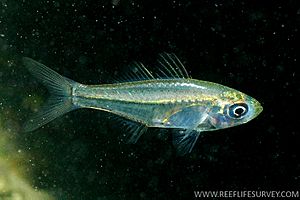Port Jackson glassfish facts for kids
Quick facts for kids Port Jackson glassfish |
|
|---|---|
 |
|
| Scientific classification | |
| Synonyms | |
|
Pseudambassis jacksoniensis Macleay |
The Ambassis jacksoniensis, also known as the Port Jackson glassfish, is a type of fish. It belongs to the Ambassidae family. This fish lives in the waters off eastern Australia. It gets its name "glassfish" because its body is see-through, almost like glass!
What's in a Name?
A scientist named William John Macleay first described the Port Jackson glassfish in 1881. He called it Pseudambassis jacksoniensis. He found a specimen in Port Jackson, a famous harbor in Australia. The name "jacksoniensis" comes from this place.
Later, in 1935, another scientist named Gilbert Percy Whitley thought this fish was special. He put it in a new group called Velambassis. He noticed its back fins had weaker spines than other fish in its family.
However, in 1990, other scientists decided it fit better in the group Ambassis. So, its scientific name became Ambassis jacksoniensis.
This fish and another one, the estuary glassfish (A. marianus), are the only two of their kind found in cooler waters. Most other fish in this group live in warmer places, like northern Australia and Southeast Asia.
What Does It Look Like?
The Port Jackson glassfish can grow up to about 7 centimeters (about 2.7 inches) long. It has a shiny silver body that is also semi-transparent. This means you can almost see through it!
Its head and body are covered with large, smooth scales. These are called cycloid scales. It has a short fin on its back that has a deep notch in it. Its tail fin is forked, like a letter 'V'.
This fish is a bit slimmer than its cousin, the estuary glassfish. Its body is about 33% to 38% as deep as it is long. The estuary glassfish is a bit wider. The Port Jackson glassfish also has a full lateral line running along its side. This line helps it feel vibrations in the water. Its cousin only has a partial lateral line.
Where Does It Live?
The Port Jackson glassfish lives along the coast of eastern Australia. You can find it from Moreton Bay in Queensland down to Narooma in southern New South Wales.
It prefers to live in estuaries. These are places where rivers meet the sea. It also likes protected, slightly salty streams. These streams often have mangrove trees growing along their edges.
What Does It Eat?
The Port Jackson glassfish enjoys eating tiny creatures called zooplankton. These are small animals that float in the water. The fish searches for food from the water's surface all the way down to the bottom.
Sometimes, the Port Jackson glassfish becomes food for other animals. Birds like the little pied cormorant and the little black cormorant like to eat them.
See also
 In Spanish: Ambassis jacksoniensis para niños
In Spanish: Ambassis jacksoniensis para niños

